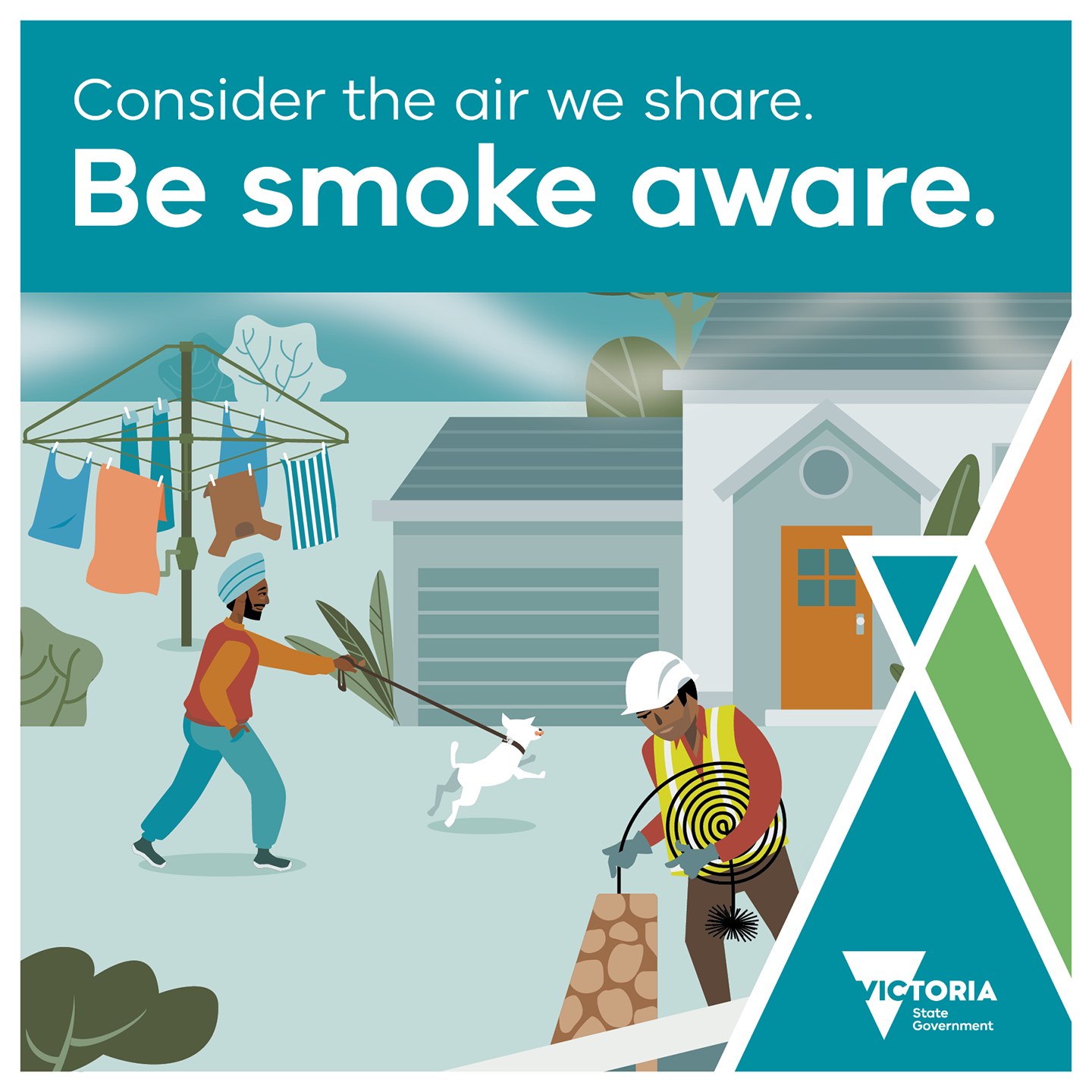Smoke from woodfire heaters can pollute the air. Learn about wood smoke pollution, its health risks, environmental impacts and how to prevent it.
Smoke from woodfire heaters
We receive more than 75 complaints a year relating to the use of woodfire heaters, fireplaces and open-air burning. Many complaints relate to the health impacts from the smoke generated.
Health impacts and risks
Brief exposure to smoke doesn’t generally lead to immediate health problems, but it can have effects on:
- people with heart or lung conditions
- pregnant women
- young children
- the elderly.
Exposure to smoke can:
- trigger asthma
- worsen heart disease.

Environmental impacts
Smoke generated from woodfire heaters contributes to air pollution as very small particles and gases are released into the atmosphere (including carbon dioxide, carbon monoxide, nitrogen oxides and volatile organic compounds).
The burning of firewood in some older-style wood heaters may produce methane and black carbon particles that increase global warming when compared to electric heating powered by renewable energy.
What you can do
Stop using your woodfire heater and upgrade it to a cleaner and more efficient form of heating. Find out how you can switch to energy-efficient, all-electric heating.
If your woodfire heater is the only source of heating, remember the following tips:
- ensure it complies with Australian Standards AS 4012 and AS 4013 (If your current woodfire heater does not comply, it is recommended you upgrade it to a cleaner and more efficient form of heating).
- always use dry, seasoned wood
- use a moisture meter to test the moisture content of the wood and ensure it contains no more than 20 per cent moisture
- never burn painted or treated wood
- don’t allow the wood heater to smoke or smoulder
- allow air to flow through and never overload the wood heater
- regularly clean the woodfire heater and remove ash
- ensure the flue is cleaned at least once per year
- ensure the tip of the flue is above your neighbour’s roof line.
Talk to your neighbours as smoke from woodfire heaters (even when operated correctly) can be harmful to their health.
Register your woodfire heater with Council
We want to hear from you. There is no fee to register your woodfire heater however by doing so, we can update you on sustainable heating options and incentives which may become available.
What we are doing
We endorsed a Woodfire Heating Advocacy Approach in February 2022 and have requested the following action from the Municipal Association of Victoria, Environment Protection Authority (EPA) and the State Government:
- expansion of the EPA Ambient Air Network onto Council land and assets for air monitoring
- the restriction of woodfire heater use in urban and built-up areas
- support households with no other main form of heating to promptly switch to electric heating options through the introduction of bulk-buy, subsidy or other incentive scheme.
Our Climate Emergency Response Strategy 2021–2025
Our Climate Emergency Response Strategy 2021–2025 includes the goal of net-zero community emissions by 2030, and Council is committed to empowering our community to reduce their emissions at home, work, school and as a community.
To work towards this goal, we provide support to households to transition to efficient electric heating and rooftop solar.
Council and State requirements
Through the Community Local Law 2019, Council manages concerns with smoke which is generated from woodfire heaters, as follows:
38. Lighting fires
(3) A person must not allow any-
(a) Fire lit for religious practices; or
(b) Barbecue; or
(c) fire pit, brazier or chiminea on any private land in a Residential Area-
to discharge any dust, grit, ash, smoke, effluvium, substance or odour that constitutes a nuisance or is an unreasonable interference with the amenity of any other person.
We have the power under the nuisance provisions of the Public Health and Wellbeing Act 2008 to deal with woodfire heater complaints where the effects of the smoke is deemed to be dangerous or offensive to health.
While we cannot control the types of woodfire heaters that are installed in dwellings, the material used to fuel the woodfire heaters and the effects the smoke causes is something we can investigate and take enforcement action in accordance with the above-mentioned legislation.
Regulation and manufacture of woodfire heaters
The Environment Protection Authority (EPA) regulates the manufacture and supply requirements of solid fuel heaters. In Victoria, woodfire heaters must comply with Australian Standards AS 4012 and AS 4013 to minimise air pollution, health impacts, amenity concerns and the effects on the environment. Solid fuel heaters must be installed by a registered or licensed person with the Victorian Building Authority (VBA) in Mechanical Services.
According to the EPA ‘buying the right wood heater, using it correctly and maintaining it well can reduce wood smoke pollution. Burning firewood the right way can help you keep your house warm’.
However, even when woodfire heaters are operated correctly, the smoke is a contributor to environmental air pollution as very small particles and gases are released into the atmosphere and cause air pollutants.
To find out more on smoke from woodfire heaters visit the Victorian EPA's website.
